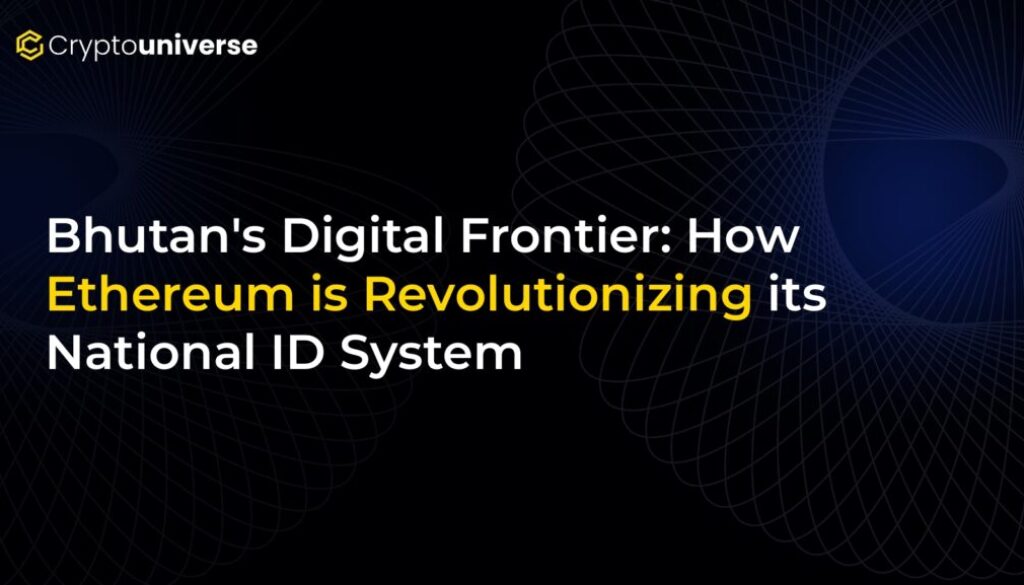Bhutan’s Digital Frontier: How Ethereum is Revolutionizing its National ID System

A Himalayan Kingdom’s Leap into the Future of Identity
In a landmark move for digital governance, the Kingdom of Bhutan has officially announced its transition to a national identity system built on the Ethereum blockchain. This forward-thinking initiative aims to provide its citizens with a secure, private, and efficient way to manage their identities, setting a powerful precedent for nations worldwide. The project, which recently completed its integration phase, signals a new era where blockchain technology underpins core government services.
The launch ceremony was attended by key figures, including Ethereum co-founder Vitalik Buterin and Ethereum Foundation President Aya Miyaguchi, underscoring the significance of this collaboration. According to Miyaguchi, the migration of all Bhutanese residents to the new system is expected to be finalized by the first quarter of next year.
Why Traditional ID Systems are Failing
For decades, governments have relied on physical cards and centralized digital databases for national identification. While functional, these legacy systems are plagued with inherent weaknesses that put citizens at risk. Common challenges include:
- Identity Fraud: Physical documents can be easily forged, leading to widespread identity theft.
- Data Breaches: Centralized databases are prime targets for hackers, and a single breach can expose the sensitive information of millions.
- Administrative Inefficiency: Verifying identities and updating records is often a slow, paper-intensive process, creating bureaucratic hurdles for citizens and government agencies alike.
Bhutan’s decision to embrace blockchain technology is a direct response to these critical issues, seeking to build an infrastructure that is fundamentally more secure and trustworthy.
How Ethereum Powers Bhutan’s New Digital Identity
So, how exactly does this new system work? Instead of a physical card or a file in a government database, each citizen’s identity is transformed into a secure, encrypted digital token on the Ethereum blockchain. This is made possible by Ethereum’s core features:
Smart Contracts: The Engine of Trust
At the heart of the system are smart contracts—self-executing contracts with the terms of the agreement directly written into code. These contracts automate the process of identity verification, allowing for fast, tamper-proof, and transparent interactions without the need for intermediaries. When a citizen needs to prove their identity, a smart contract can instantly verify their credentials securely.
Blockchain: An Unchangeable Digital Ledger
For those new to crypto, think of the blockchain as a shared digital record book that is virtually impossible to alter. Once a transaction or piece of data (like an identity credential) is recorded, it is secured by complex cryptography and linked to the previous record. This creates an immutable chain, ensuring that a citizen’s digital identity cannot be modified or deleted without consensus from the entire network.
The Tangible Benefits for Over 700,000 Citizens
The move to an Ethereum-based ID system is not just a technological upgrade; it’s a profound improvement in the relationship between the citizen and the state. The program delivers several key advantages:
- Enhanced Security and Privacy: By decentralizing identity data, the system eliminates single points of failure. Citizens gain more control over who can access their personal information, granting permission on a case-by-case basis.
- Self-Sovereign Identity (SSI): This model empowers individuals with true ownership of their digital identities. They can manage their own credentials without relying on a central authority, a concept known as Self-Sovereign Identity.
- Streamlined Government Services: With a verifiable and trusted digital ID, processes like opening a bank account, accessing healthcare, or receiving government benefits become faster and more efficient, drastically reducing bureaucratic friction.
- Reduced Fraud and Corruption: The cryptographic integrity and transparency of the blockchain make it extremely difficult to create fake identities or tamper with public records, enhancing trust in public transactions.
A Blueprint for the World
As
As governments around the globe look to digitize public services and enhance transparency, Bhutan’s pioneering step may well be remembered as the moment when the promise of a decentralized, citizen-centric future began to take shape.


